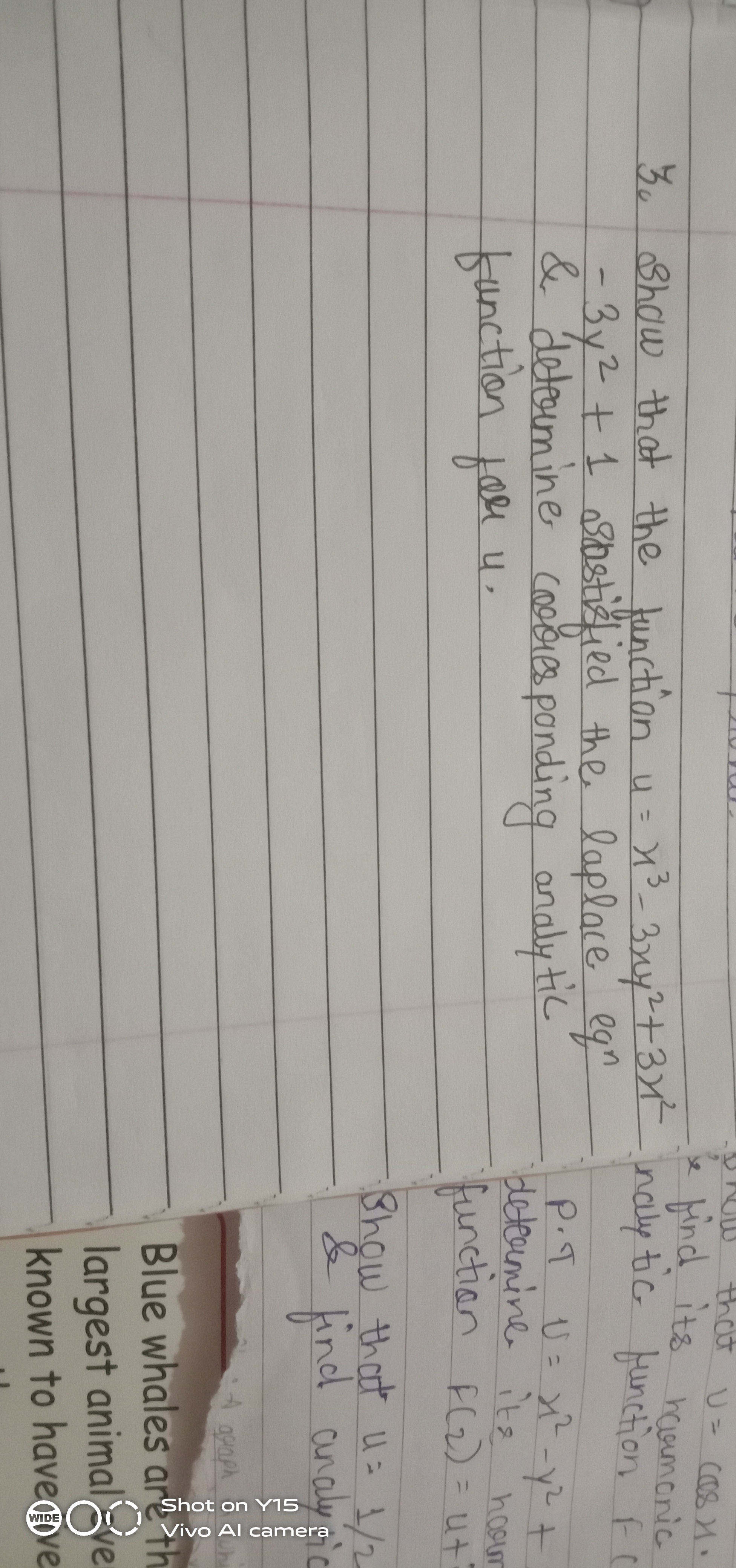Show that the function u = x^3 - 3xy^2 + 3x is harmonic and determine its corresponding analytic function.

Understand the Problem
The question is asking to show that the function u = x^3 - 3xy^2 + 3x is a harmonic function and to determine its corresponding analytic function.
Answer
The function $u = x^3 - 3xy^2 + 3x$ is harmonic, and its corresponding analytic function is $$ f(z) = (x^3 - 3xy^2 + 3x) + i(3x^2y - y^3 + 3y + C) $$.
Answer for screen readers
The function $u = x^3 - 3xy^2 + 3x$ is harmonic, and its corresponding analytic function is $$ f(z) = (x^3 - 3xy^2 + 3x) + i(3x^2y - y^3 + 3y + C) $$.
Steps to Solve
- Determine the Partial Derivatives Calculate the first-order partial derivatives of the function $$ u = x^3 - 3xy^2 + 3x $$
The partial derivatives are:
- With respect to $x$: $$ u_x = \frac{\partial u}{\partial x} = 3x^2 - 3y^2 + 3 $$
- With respect to $y$: $$ u_y = \frac{\partial u}{\partial y} = -6xy $$
- Calculate the Second Partial Derivatives Next, compute the second-order partial derivatives:
- With respect to $x$ (twice): $$ u_{xx} = \frac{\partial^2 u}{\partial x^2} = 6x $$
- With respect to $y$ (twice): $$ u_{yy} = \frac{\partial^2 u}{\partial y^2} = -6x $$
- Apply the Laplace Equation For $u$ to be harmonic, it must satisfy the Laplace equation: $$ u_{xx} + u_{yy} = 0 $$
Substituting the second derivatives: $$ 6x - 6x = 0 $$
This confirms that $u$ is harmonic.
- Determine the Corresponding Analytic Function To find the analytic function, we can use the Cauchy-Riemann equations:
- The general form of the analytic function $f(z) = u + iv$ implies that: $$ v_y = u_x $$ $$ v_x = -u_y $$
From $u_x$ and $u_y$, set up the equations:
-
Integrate $u_x = 3x^2 - 3y^2 + 3$ with respect to $y$: $$ v = \int (3x^2 - 3y^2 + 3) , dy = 3x^2y - y^3 + 3y + g(x) $$ where $g(x)$ is a function of $x$.
-
Differentiate $v$ with respect to $x$ to find $g'(x)$: $$ v_x = 6xy + g'(x) $$
Set $v_x = -u_y = 6xy$ and solve for $g'(x)$: $$ g'(x) = 0 \Rightarrow g(x) = C $$
- Final Form of the Analytic Function Substituting back, we get: $$ f(z) = (x^3 - 3xy^2 + 3x) + i(3x^2y - y^3 + 3y + C) $$
Thus, the corresponding analytic function is: $$ f(z) = u + iv $$
The function $u = x^3 - 3xy^2 + 3x$ is harmonic, and its corresponding analytic function is $$ f(z) = (x^3 - 3xy^2 + 3x) + i(3x^2y - y^3 + 3y + C) $$.
More Information
A harmonic function is one that satisfies Laplace's equation, indicating it has mean value properties and is smooth. The analytic function associated with a harmonic function is obtained using the Cauchy-Riemann equations, which relate the real and imaginary parts.
Tips
- Failing to correctly compute the second partial derivatives can cause confusion when applying the Laplace equation.
- Ignoring the integration constant $C$ when finding the analytic function can lead to an incomplete solution.
AI-generated content may contain errors. Please verify critical information